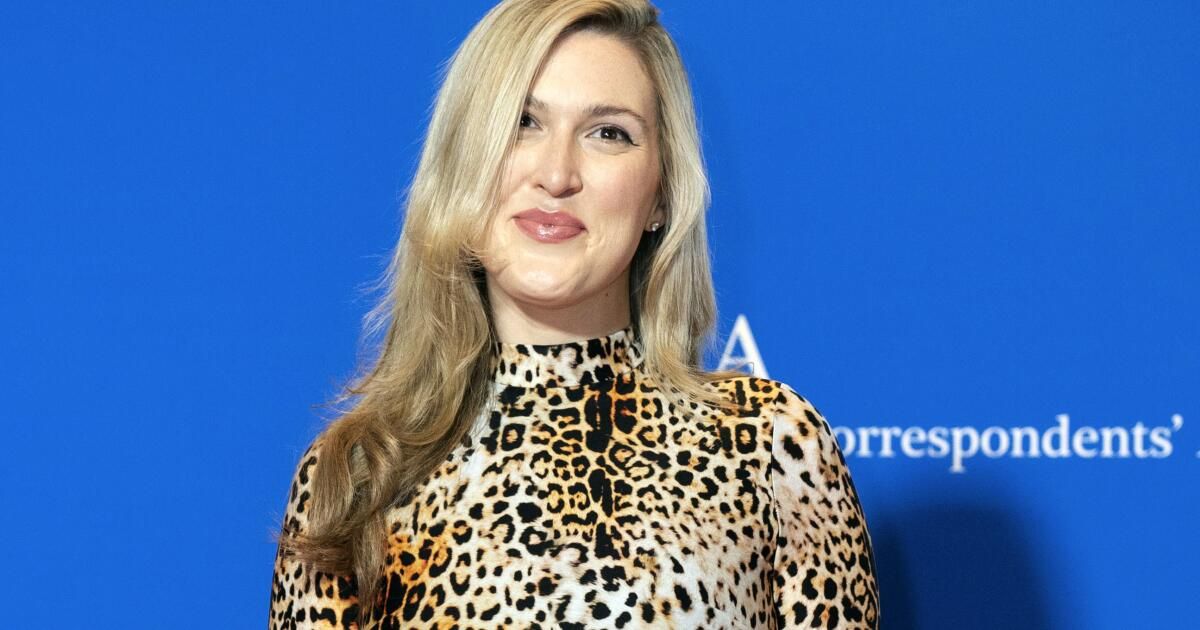There are so many embarrassing things about New York magazine journalist Olivia Nuzzi's inappropriate relationship with Robert F. Kennedy Jr.
First, he’s married (the political heir’s wife is actress Cheryl Hines). Second, Nuzzi is 31 and Kennedy, who is entering Hugh Hefner territory, is 70. Third, she was until recently engaged to political journalist Ryan Lizza, who was the subject of the “MeToo” campaign in 2017, when the New Yorker fired him for what it described as sexual misconduct.
Aside from prurient interest, why should any of us really care?
It is a stain on Nuzzi's journalistic integrity as the magazine's Washington correspondent and, worse still, a stain on New York, whose editors were caught off guard by the story.
New York suspended her for violating its rules on “conflicts of interest and disclosures,” according to an unsigned note to readers posted on the magazine’s website. “Had the magazine been aware of this relationship, she would not have continued to cover the presidential campaign. We regret this violation of our readers’ trust,” it said.
While carrying on a relationship with Kennedy (which she says began late last year, after she wrote a profile of him, and ended in August), Nuzzi continued to discuss the presidential race. In March, during a discussion with journalists Frank Bruni and Joe Klein published by the New York Times, she criticized the “establishment press” for failing to treat Kennedy as a serious contender in what she called “a three-man race.” In July, the month before Kennedy dropped out and endorsed former President Trump, she wrote a disparaging piece about the “conspiracy of silence” to protect Trump’s then-rival, President Biden.
Not only did Nuzzi's conduct cross an ethical line, he sped down a highway filled with warning signs, flashing lights and oncoming traffic. Someone (sorry for the reference to other strange RFK Jr. stories) is bound to get hit by a car. And it won't be him.
Curiously, many journalists were quick to defend the indefensible.
“If we were all judged by our worst moments or our biggest mistakes, how many of us would come out looking anything but awful?” wrote journalist Chris Cilizza in X.
“'I'm mad at Olivia Nuzzi' is this Friday's 'I hate Taylor Swift'” Caitlin Flanagan of The Atlantic wrote on X, referring to Trump’s comment after Swift endorsed Kamala Harris. “Beautiful women are disturbing and unsettling. This is not uranium dust.”
“Journalists have all kinds of compromising relationships with their sources,” wrote Ben Smith in Semafor. “The most compromising of all, and the most common, is a journalist’s loyalty to someone who gives him information. That is the real currency in this field. Sex hardly counts.”
Oh, the world-weariness that all this brings!
The sexual scandals in journalism we have had in recent years have generally been of the #MeToo variety: a boss harasses a subordinate. Many well-known journalists were forced out of their jobs and disgraced for misbehaving: Charlie Rose, Matt Lauer, Mark Halperin, Bill O'Reilly, Roger Ailes, etc.
I can’t recall a single high-profile journalist who lost her career for sexually harassing or assaulting a female subordinate. In fact, I recall exactly one: Kimberly Guilfoyle, Gavin Newsom’s ex-wife and current partner of Donald Trump Jr., who, according to reports by The New Yorker and others, was forced out of her job at Fox News in 2018 after being accused of sexually harassing a female assistant.
While women rarely exhibit the predatory behavior of men, they are certainly known to behave sexually inappropriately at work, but their transgressions are often consensual.
It remains unclear whether Nuzzi has inflicted a fatal wound on his career.
“The relationship was never physical,” Nuzzi told journalist Oliver Darcy, “but it should have been disclosed to avoid the appearance of a conflict.”
An inappropriate relationship that is “not physical” could be sexting. And sexting, I would say, is sex.
In 1992, a few years before Bill Clinton argued over the definition of “sex” in a statement, Nicholson Baker wrote a steamy novel, “Vox,” about a sexual relationship between a man and a woman that unfolds entirely over the telephone. During their affair, Monica Lewinsky, then a White House intern, bought a copy for Clinton.
The relationship between Nuzzi and Kennedy was an open secret in certain media outlets, According to Business Insider, Kennedy, a former heroin addict whose second wife once found a journal in which he listed his various sexual conquests, bragged to friends that Nuzzi was sending him intimate photos. Word reached New York editor-in-chief David Haskell, who confronted his star reporter.
I'm sorry that Nuzzi has shown such poor judgment. She's an entertaining stylist and her writing is great fun to read, but she's done a disservice to her female colleagues by reinforcing the most damaging clichés about women who use their sexuality to get ahead.
In 2015, Nuzzi’s colleague at New York magazine, Marin Cogan, wrote a clever piece using the Netflix series “House of Cards” to criticize Hollywood’s portrayal of female journalists.
“In the early decades of cinema, female journalists were spunky, smart romantic counterparts: Hildy Johnson in ‘His Girl Friday’; Lois Lane in the Superman franchise,” Cogan wrote. “Then, in the 1970s and 1980s, television gave us two female journalists, still spunky but far more independent, whom we could root for: Mary Tyler Moore and Murphy Brown. But somewhere in the last 20 years, we became monsters of ambition and promiscuity.”
Nuzzi tweeted the articleasking: “Why does Hollywood think female journalists sleep with their sources?”
Sigh. The jokes really do write themselves.












